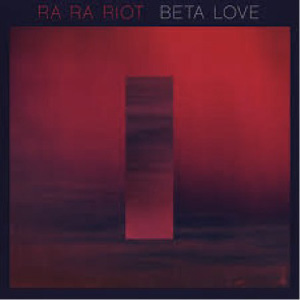Ra Ra Riot – Beta Love (Barsuk)
Ra Ra Riot is a band that is well versed in change. Their front man left within a year of the band’s formation, the original drummer died in 2007 from circumstances that are still being investigated, and after 2011’s critically acclaimed 2nd LP The Orchard, cellist Alexandra Lawn announced that she would be leaving the band. This makes Ra Ra Riot sound a lot more Spinal Tap than chamber pop, but with their 3rd LP, Beta Love (Barsuk Records), a change in sound is the big talking point.
Released Jan 21st, 2013 via Barsuk / By Dave Reynolds
 Gone are the preppy and charming arrangements of previous records, with the delicate and neatly arranged interplay between classic rock instruments and the cello and violin. However, the change in sound isn’t due to as simple a reason as a formation change. The record is said to have been inspired by the works of cyberpunk novelist William Gibson and futurist Ray Kurzweil. In Kurzweil’s book The Singularity Is Near, he describes his law of accelerating returns which predicts an exponential increase in technologies. He says this will lead to a technological singularity in the year 2045, a point where progress is so rapid it outstrips humans' ability to comprehend it. Beta Love sounds like a record that has arrived in a time machine from 2045, complete with Back To The Future II clothing and an air of rambunctiousness. Unfortunately, as with the aforementioned near-miss of a sequel, it doesn’t exactly hit the spot.
Gone are the preppy and charming arrangements of previous records, with the delicate and neatly arranged interplay between classic rock instruments and the cello and violin. However, the change in sound isn’t due to as simple a reason as a formation change. The record is said to have been inspired by the works of cyberpunk novelist William Gibson and futurist Ray Kurzweil. In Kurzweil’s book The Singularity Is Near, he describes his law of accelerating returns which predicts an exponential increase in technologies. He says this will lead to a technological singularity in the year 2045, a point where progress is so rapid it outstrips humans' ability to comprehend it. Beta Love sounds like a record that has arrived in a time machine from 2045, complete with Back To The Future II clothing and an air of rambunctiousness. Unfortunately, as with the aforementioned near-miss of a sequel, it doesn’t exactly hit the spot.Out with the old and in with the synths, the record is heavy with the syrupy end of the instrument’s scale. On tracks like ‘Binary Mind’ and ‘Beta Love’, it works. ‘Binary Mind’ bursts with electro handclap beats and a hooky chorus that sticks in your mind like chewing gum on your shoes. ‘Beta Love’ ratchets up the sugar levels by 100% of one’s RDA, but with the strings of the violin being a little more prevalent than on other tracks, they help cut through the verses acerbically. Lyrically we’re wired back to the futuristic theme with references to prototypes and robot hearts, but it gets a little lost at times in the frothing of noise surrounding it.
The high key of the chorus in ‘Beta Love’ is an indication of what’s to come. Initially it’s enjoyable, but as the record continues, so much of it takes place at this heightened level and becomes a little jarring. On ‘Angel Please’, there’s a key change in the final lyric of the bridge before each chorus that becomes an awkward moment on repeated listens, causing an involuntary clench before its arrival. ‘That Much’ is exciting for the return of non-electro drumbeats, but eventually descends into feeding guitar lines through the inside of a 56k dial-up internet connection, leaving them sounding pixelated and scattered, and all together a bit more 1996 than 2045.
‘Is It Too Much’ shows an enjoyably lighter touch with the employment of a gentle industrial fuzz buzzing through the chorus. As vocalist Wes Miles lilts: “I know I never had much to say,” and speaks of “so little motion here,” this slowdown in speed is a welcome breather from the franticness of what surrounds it. As a whole, the record is a challenge to swallow in one sitting, but offers up enjoyable moments.





 All Content RSS Feed
All Content RSS Feed
Follow Bearded on...